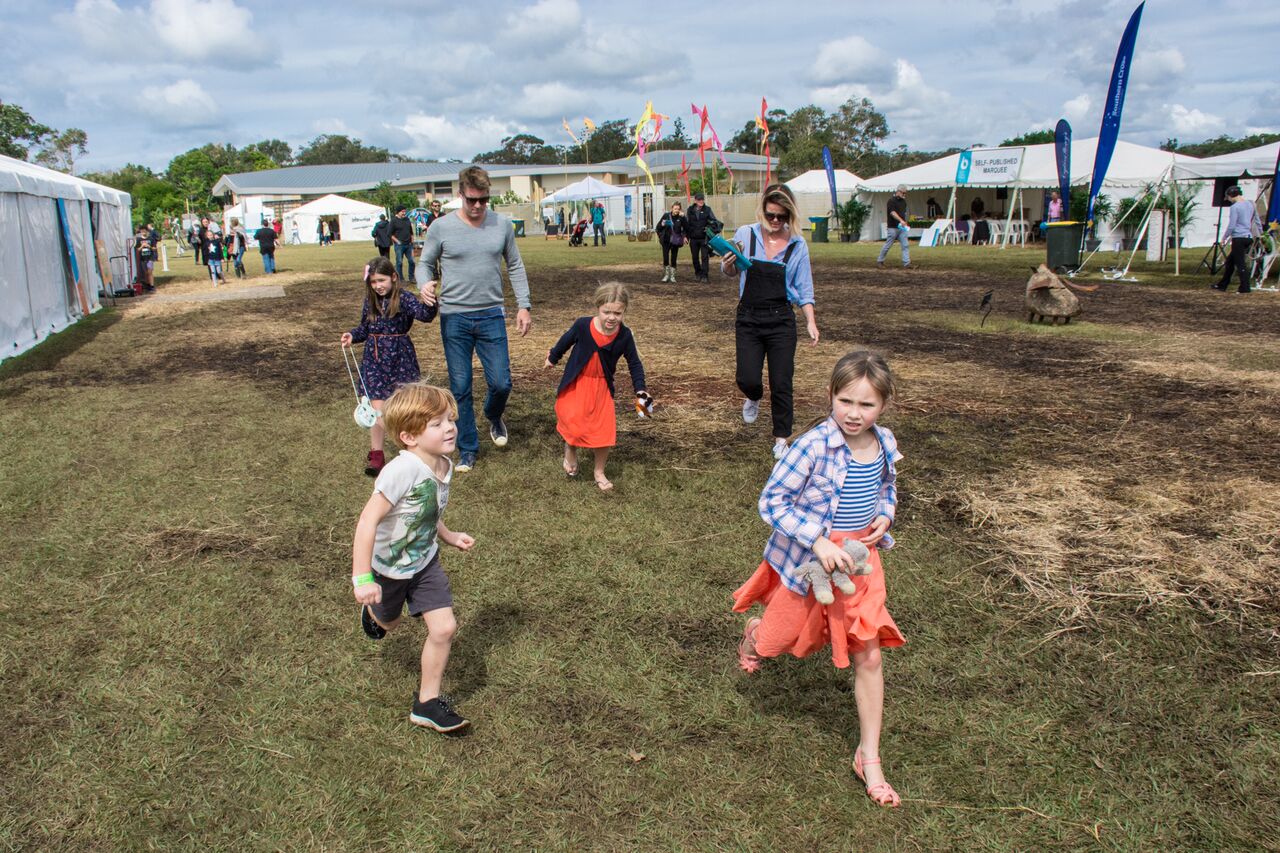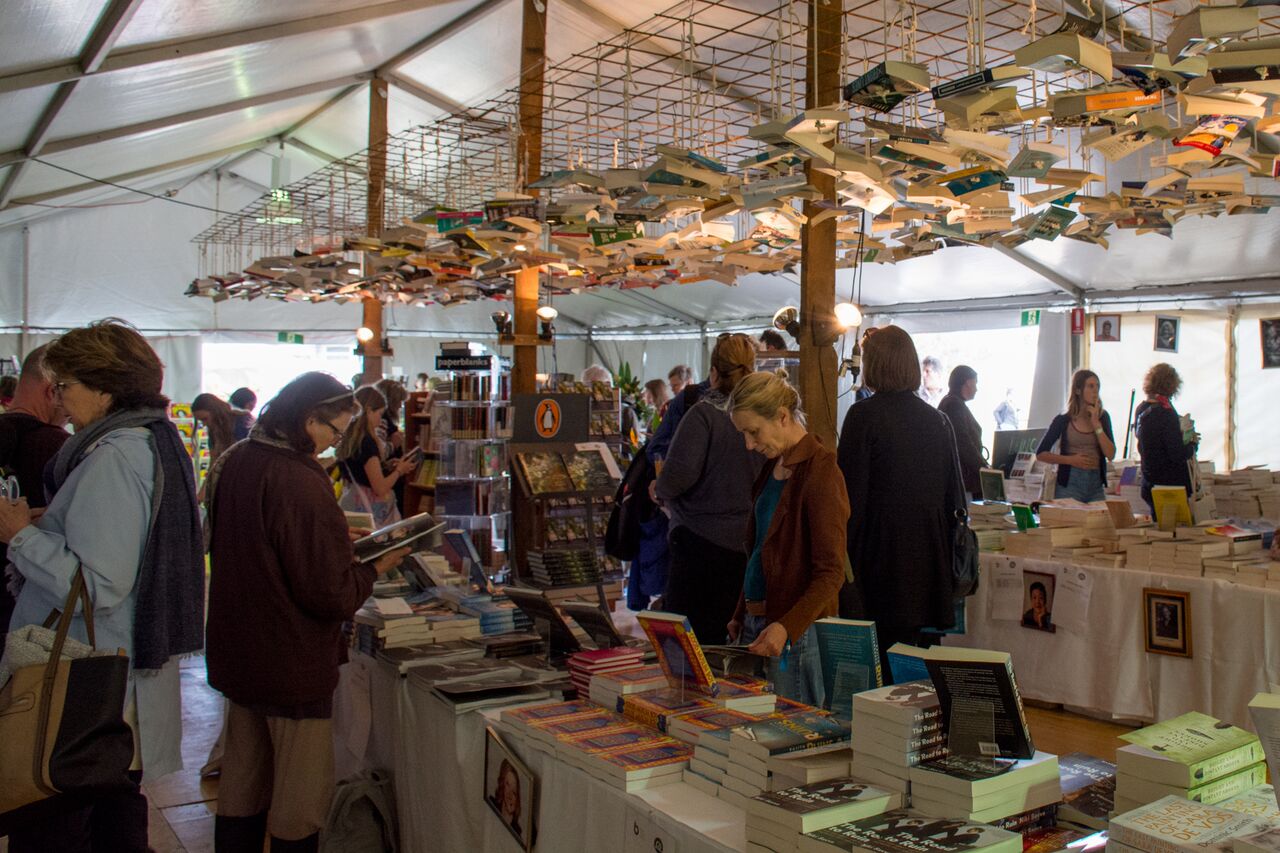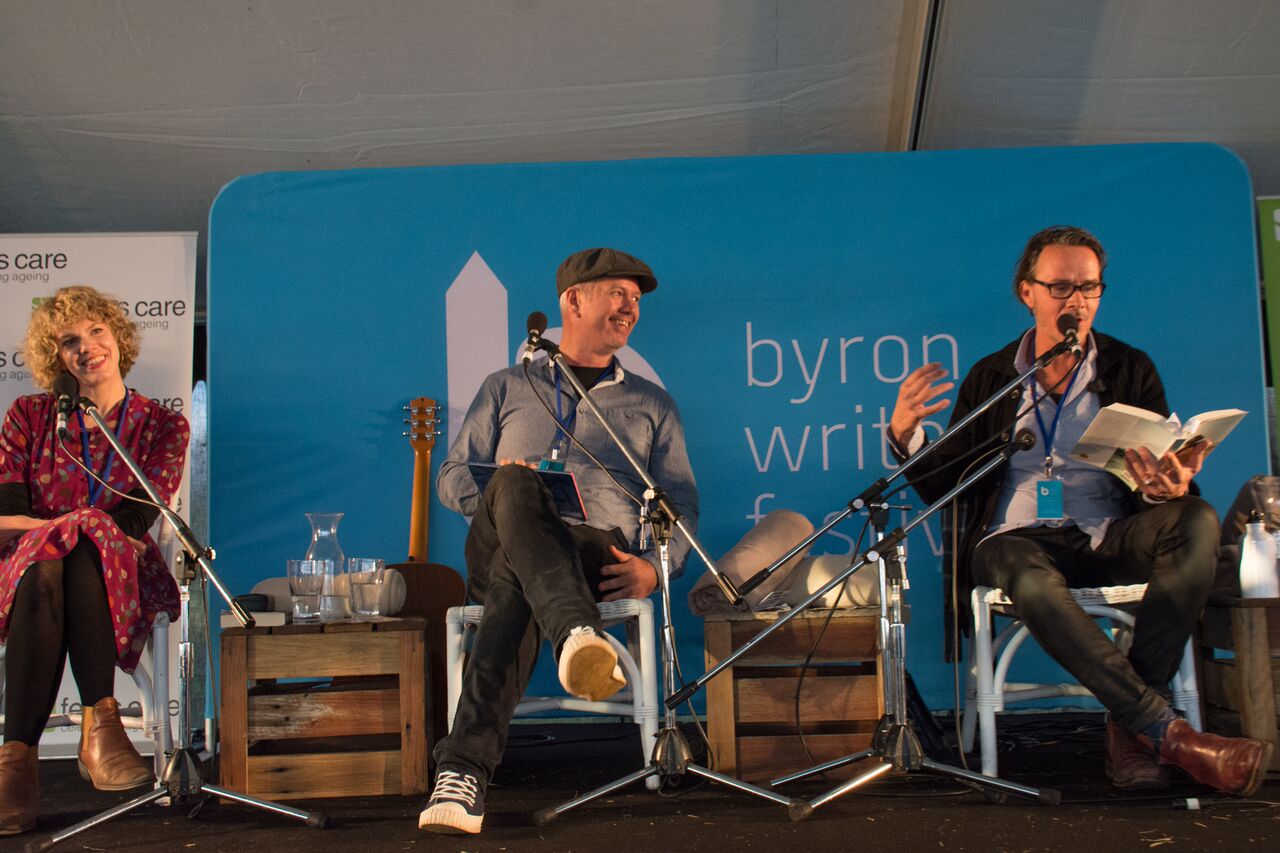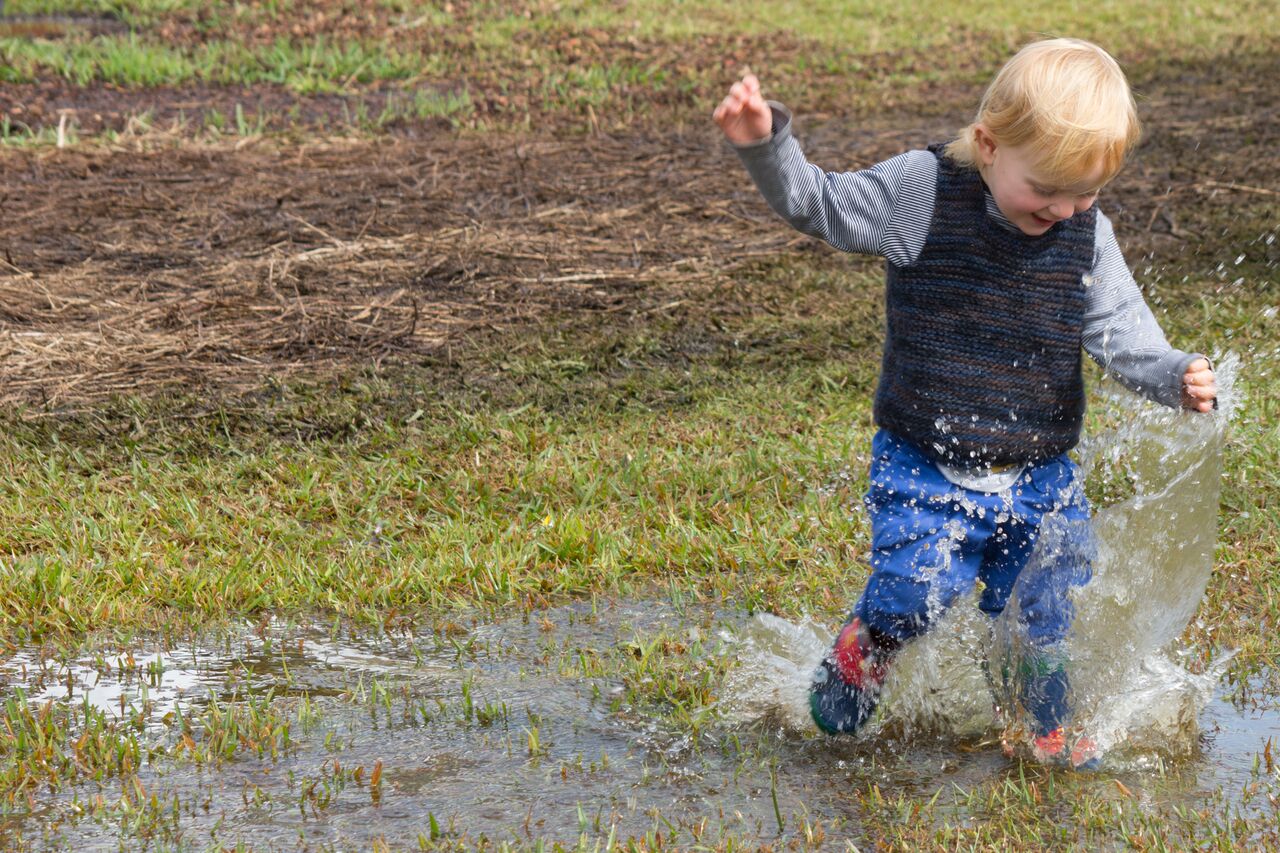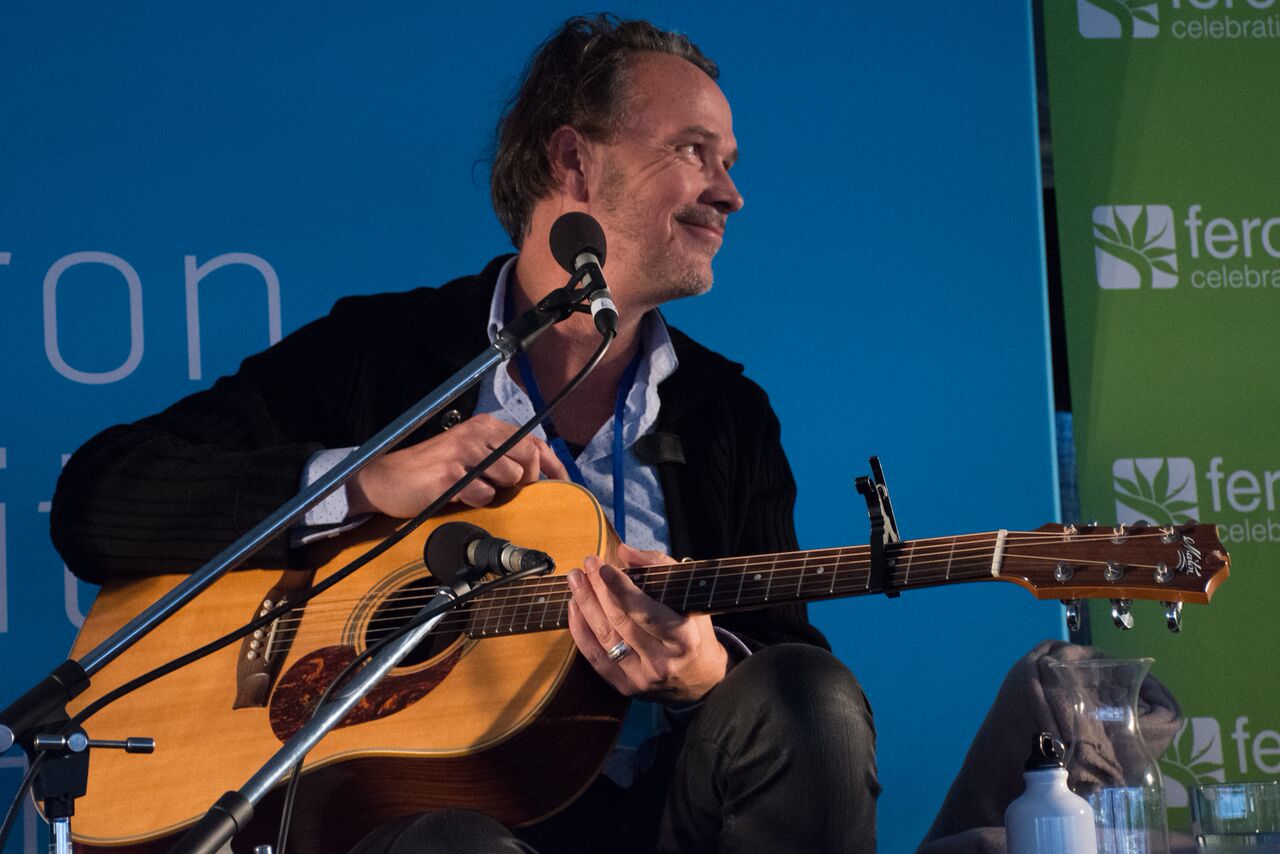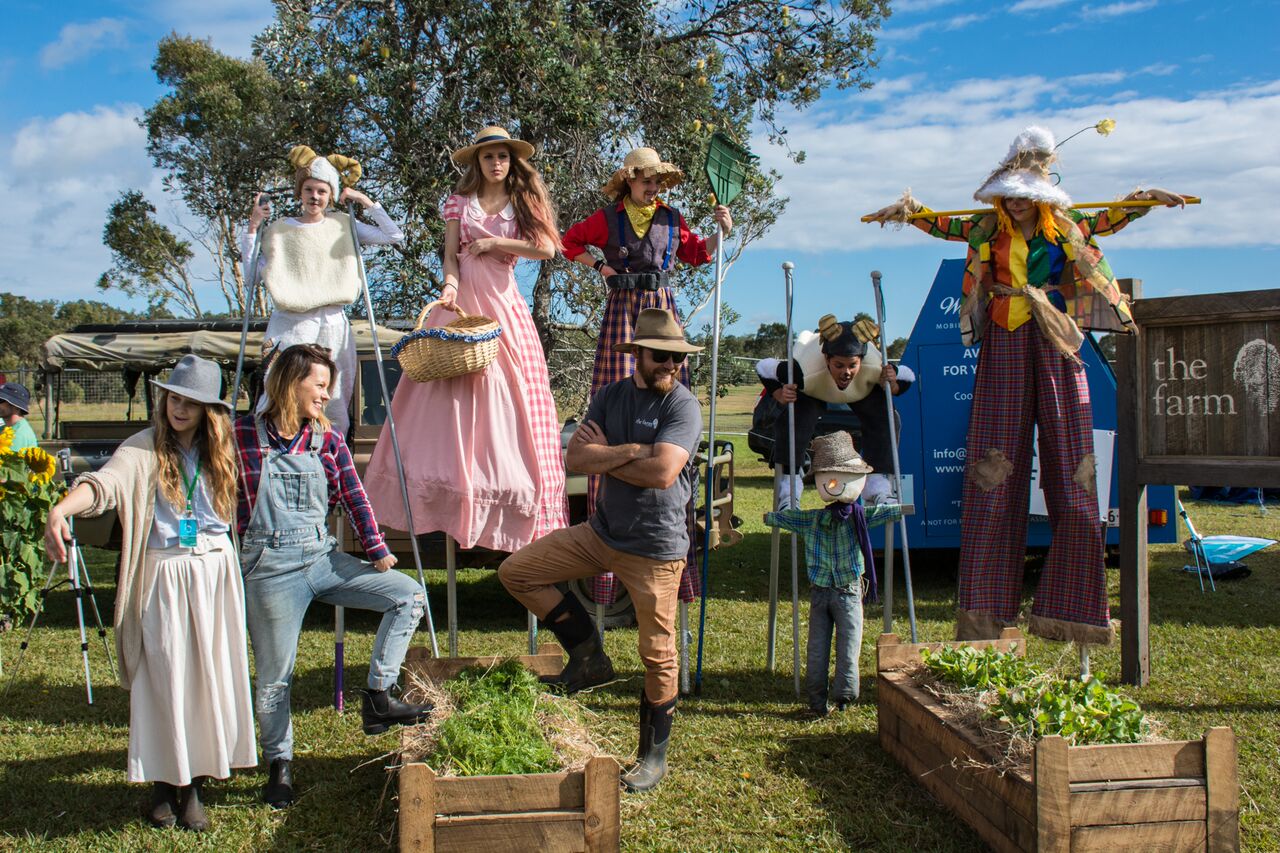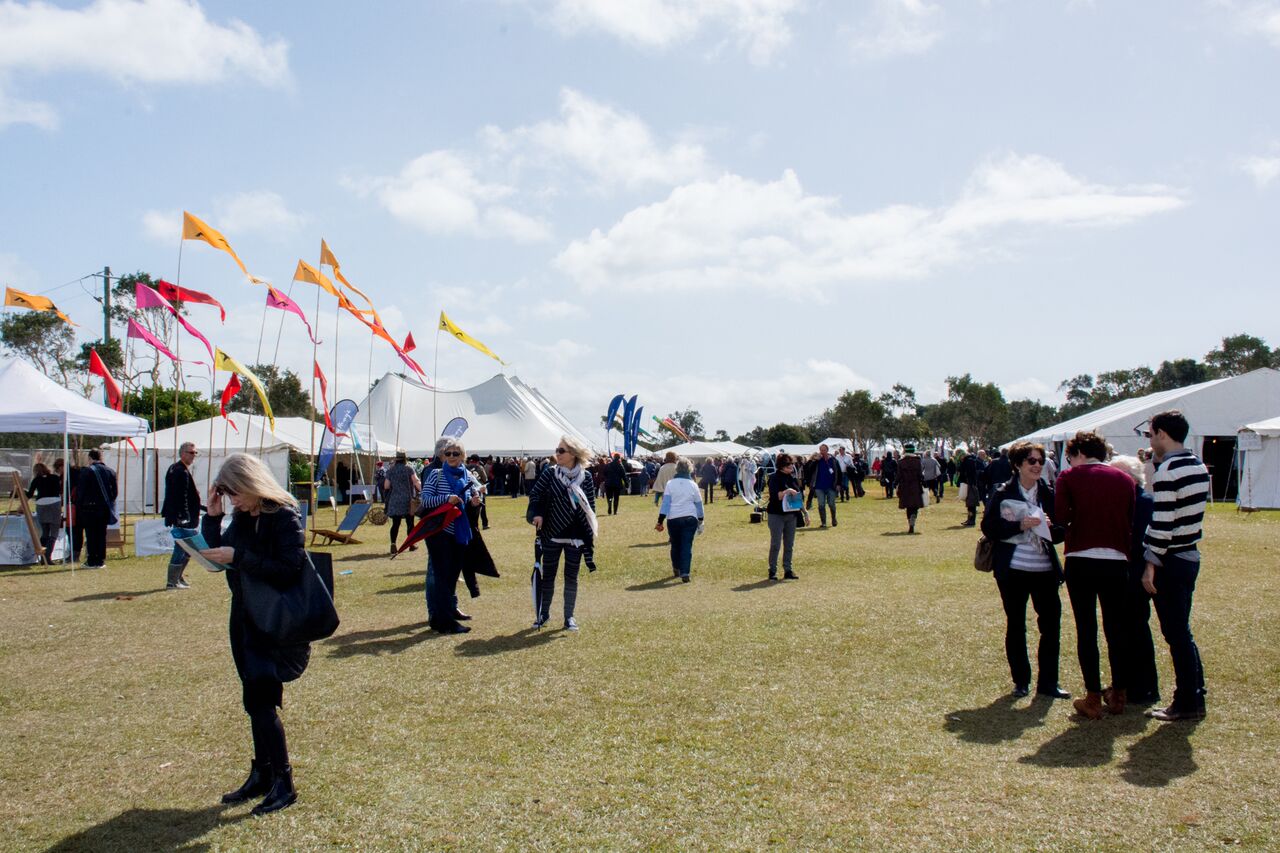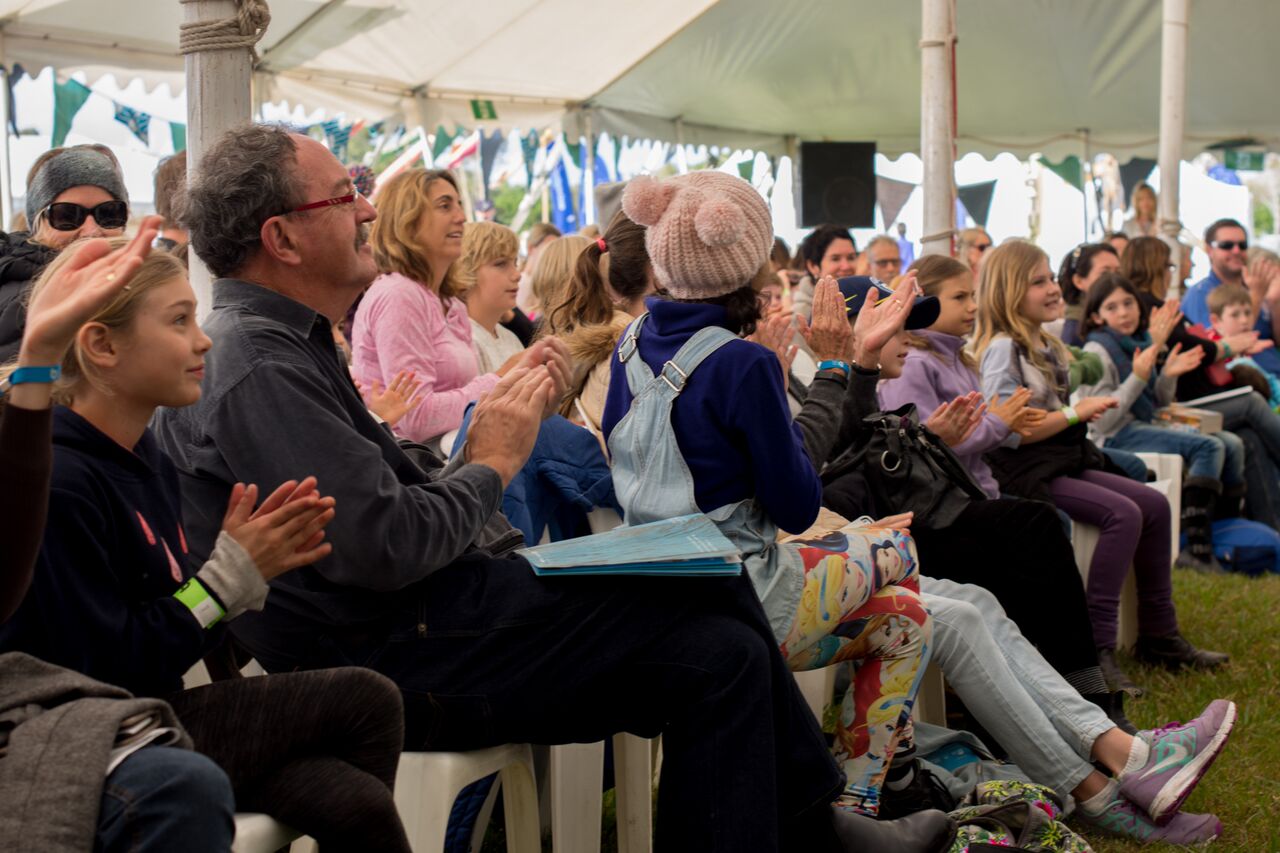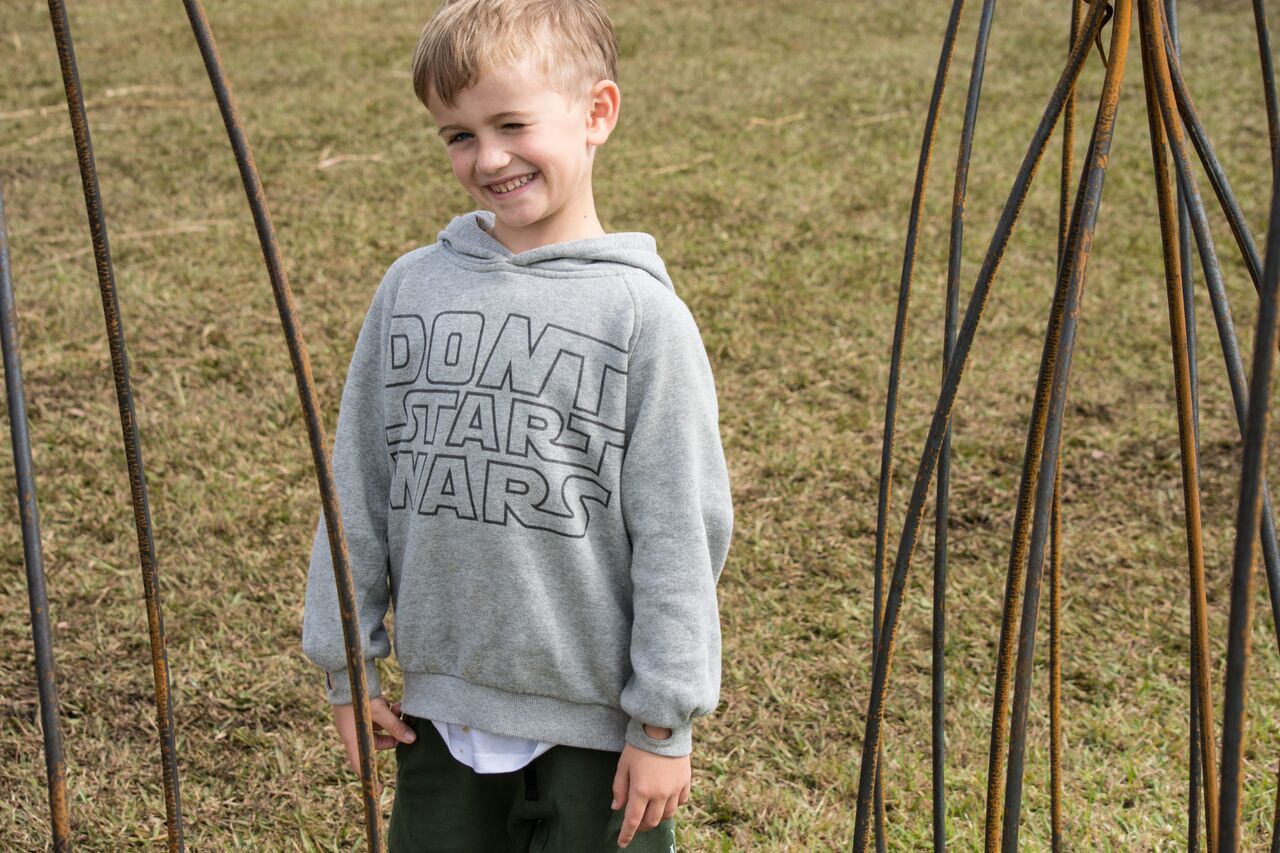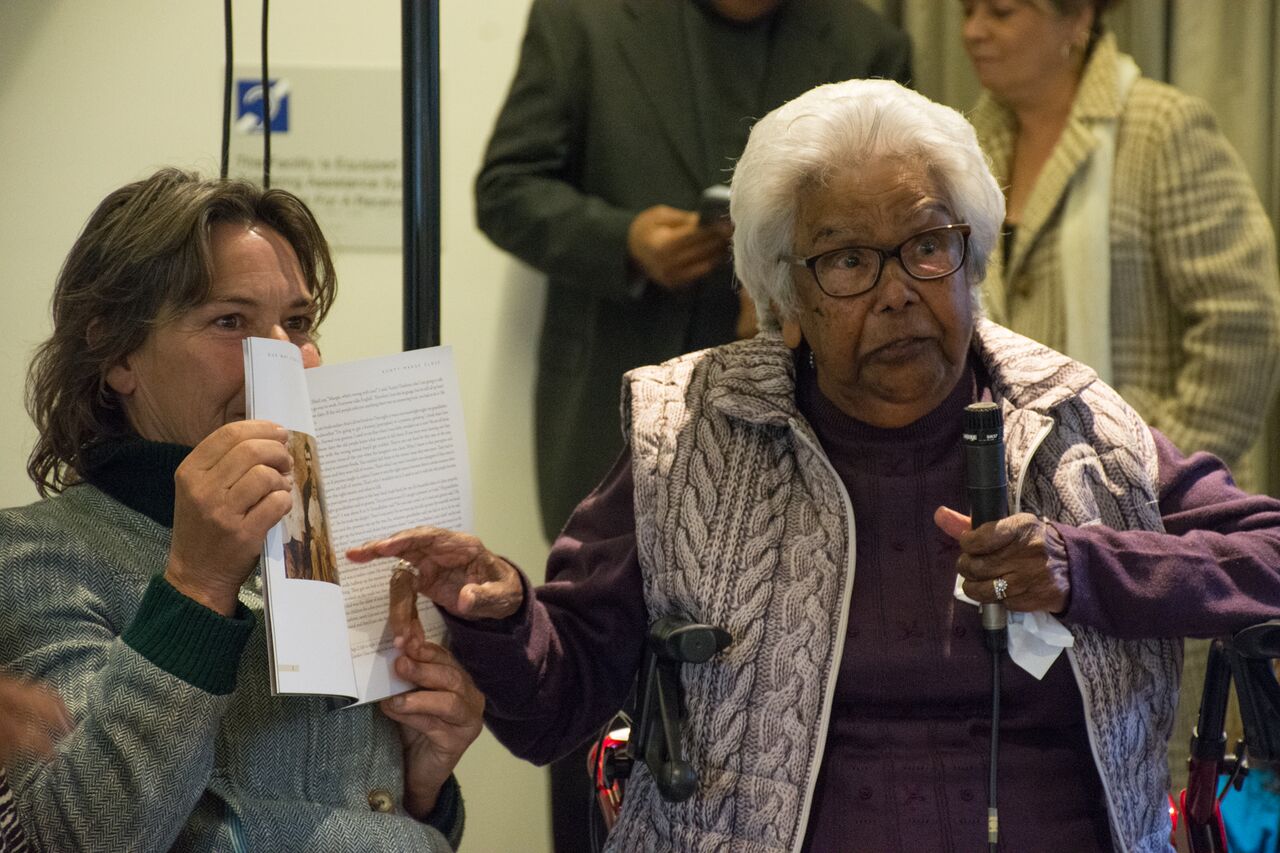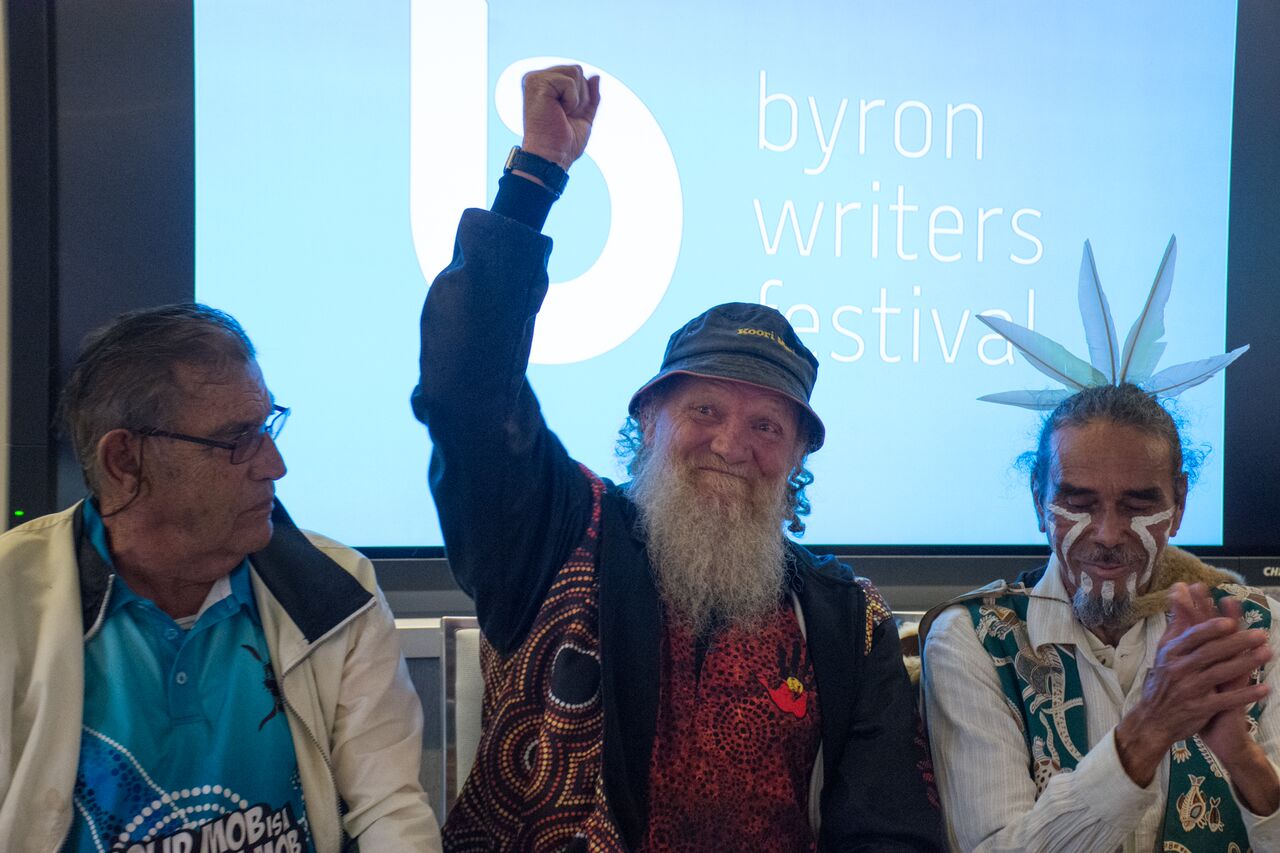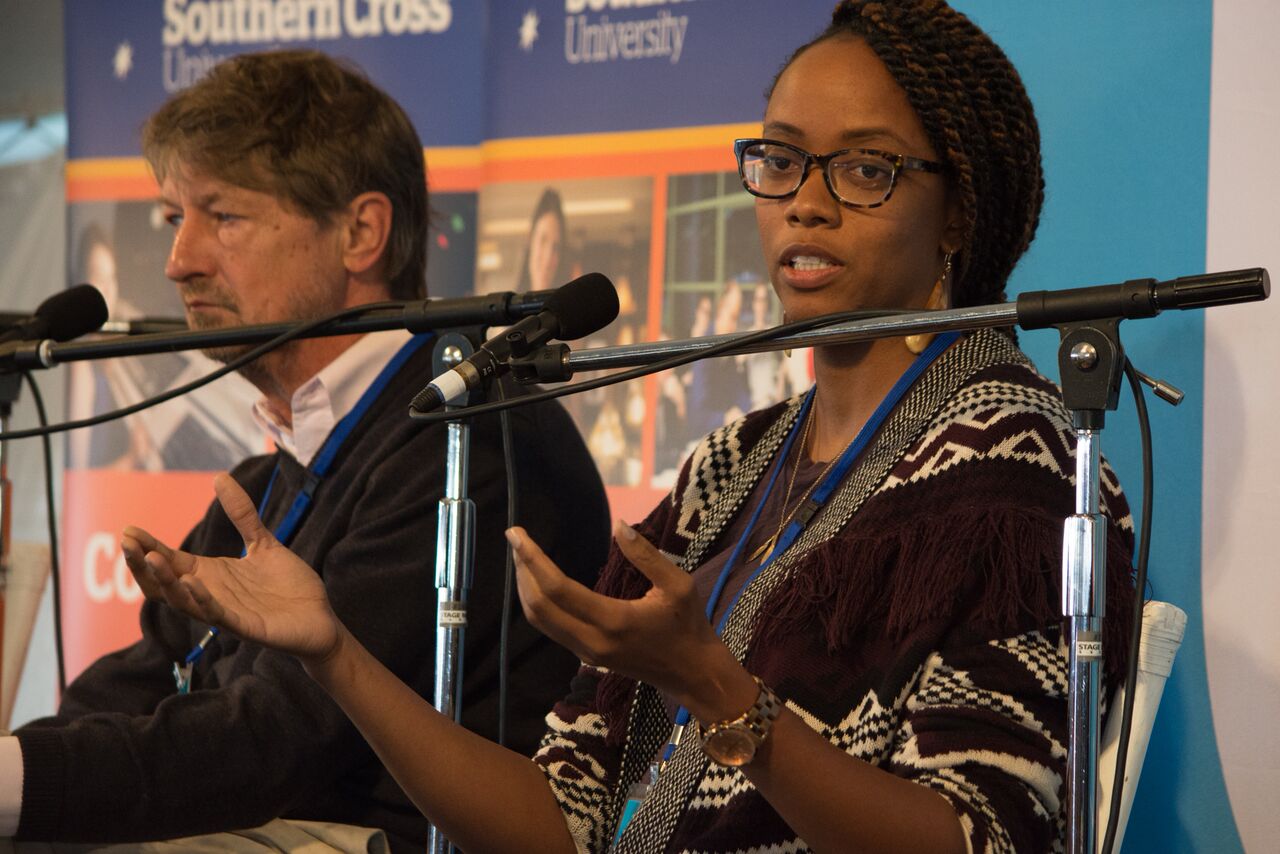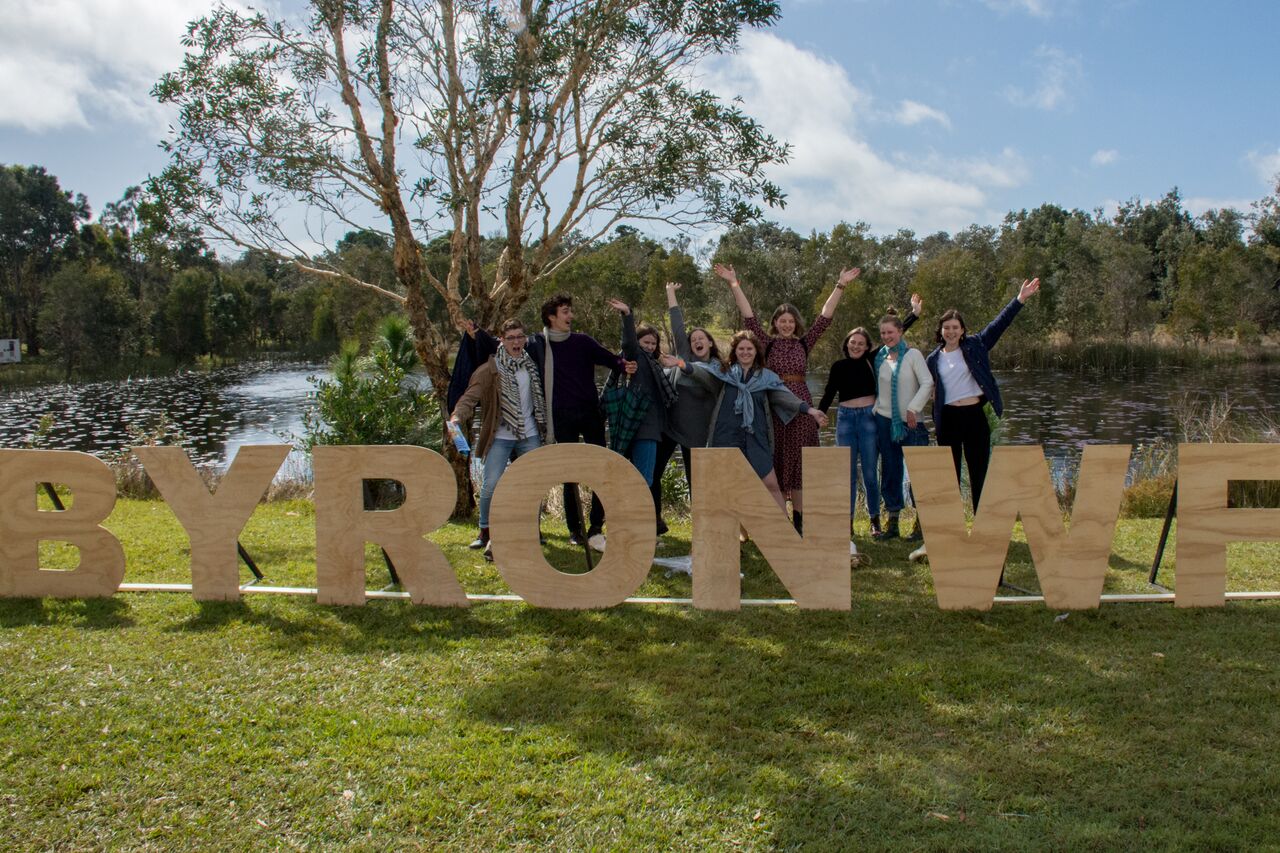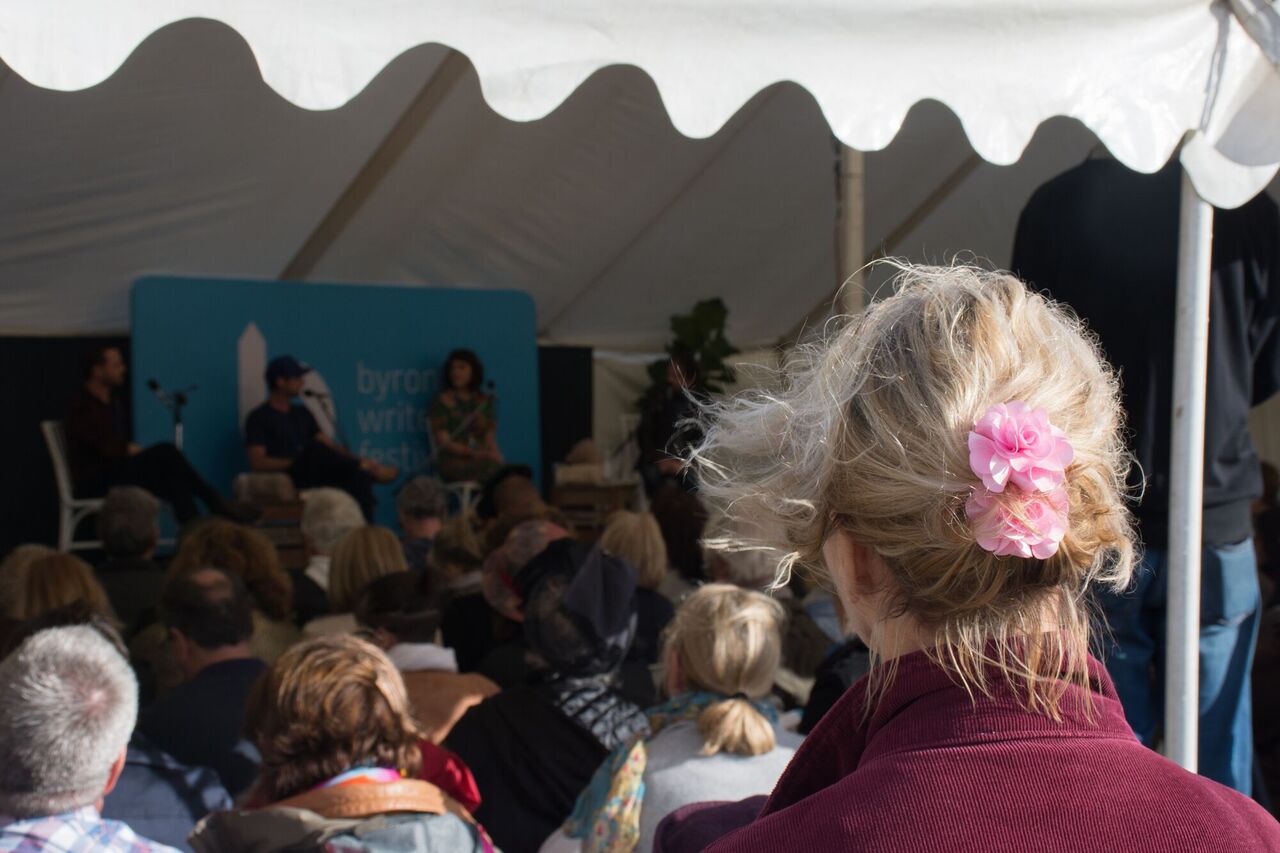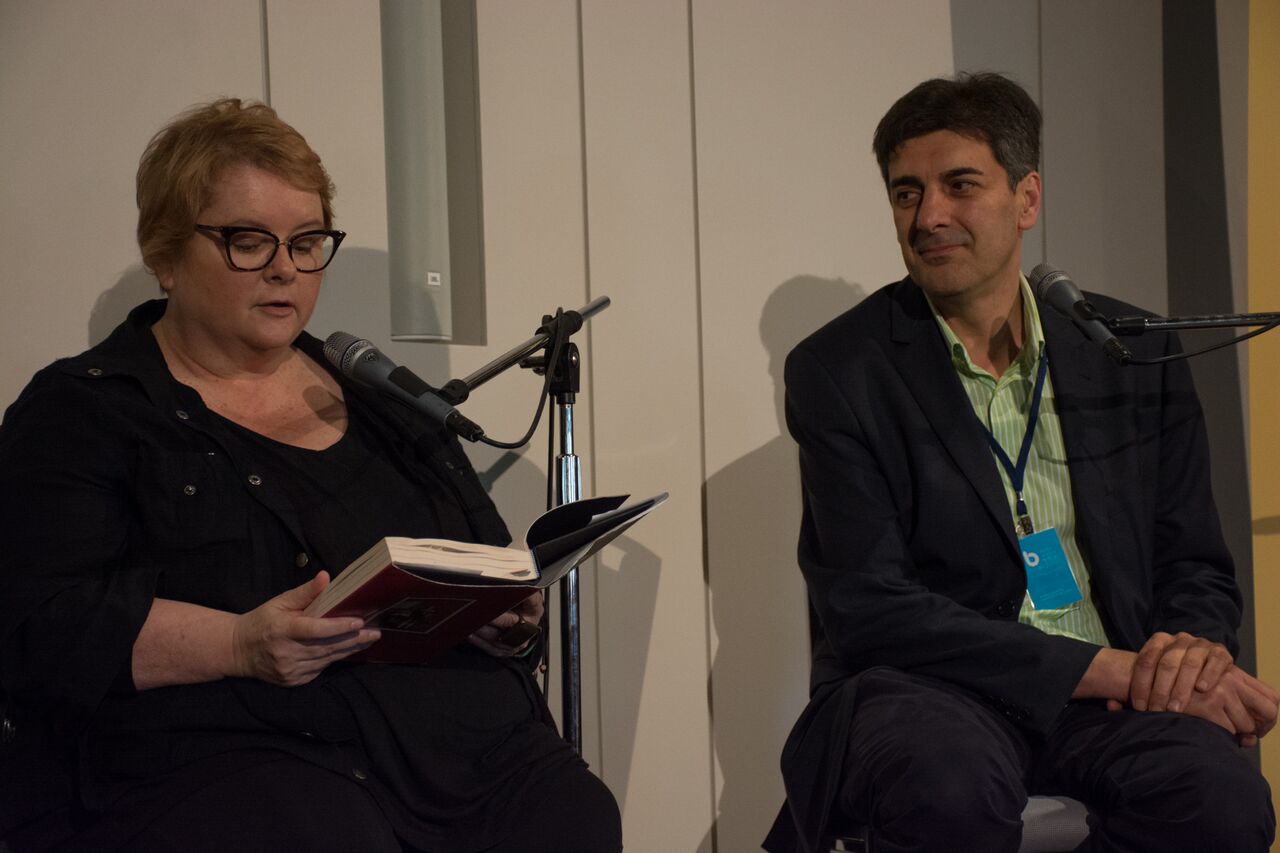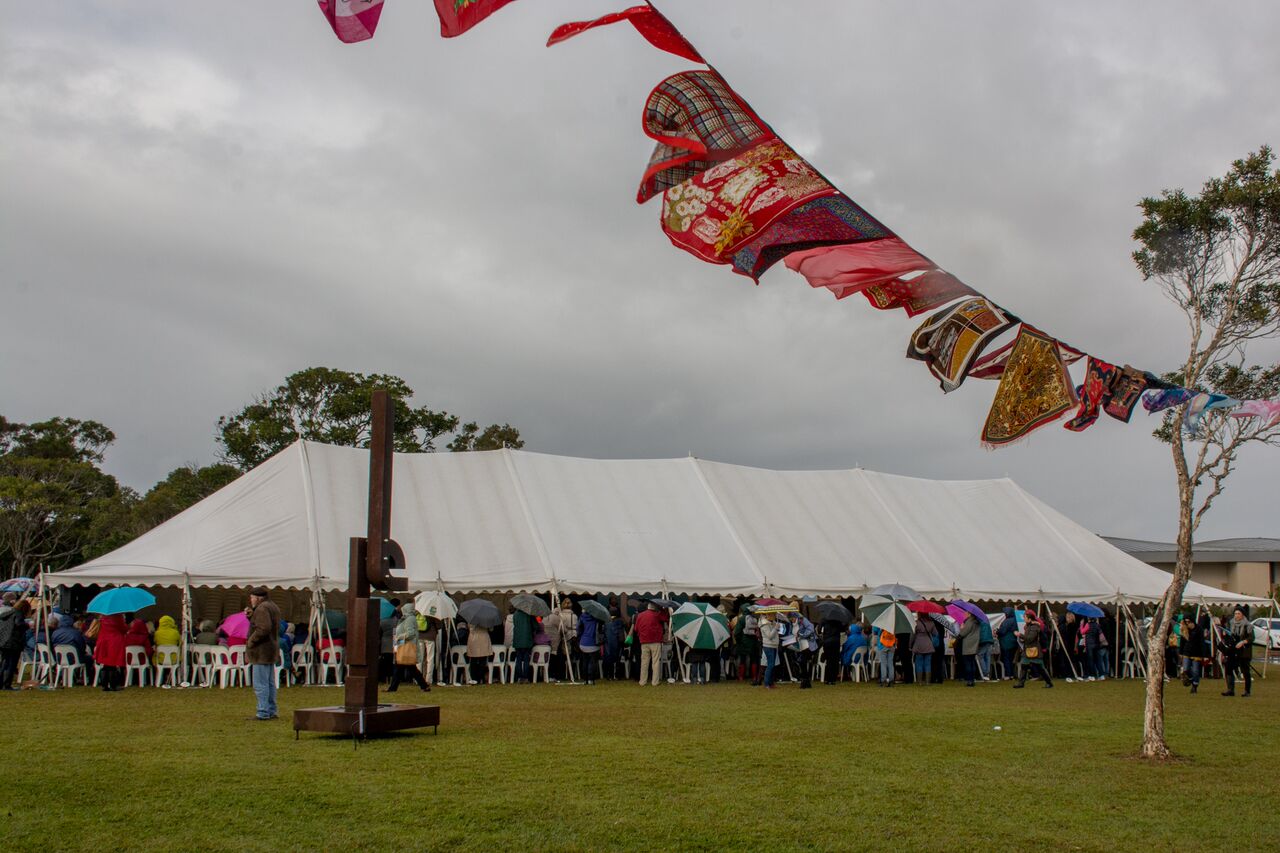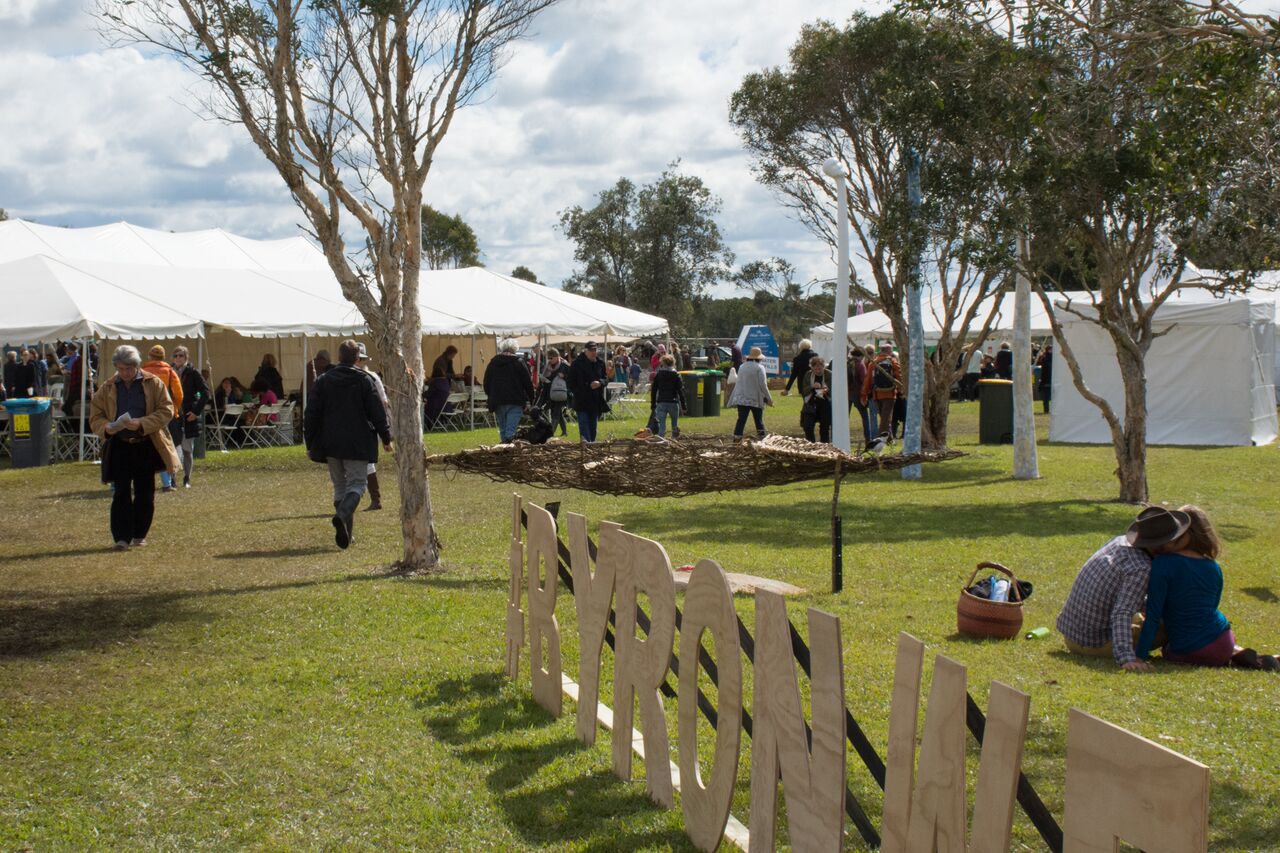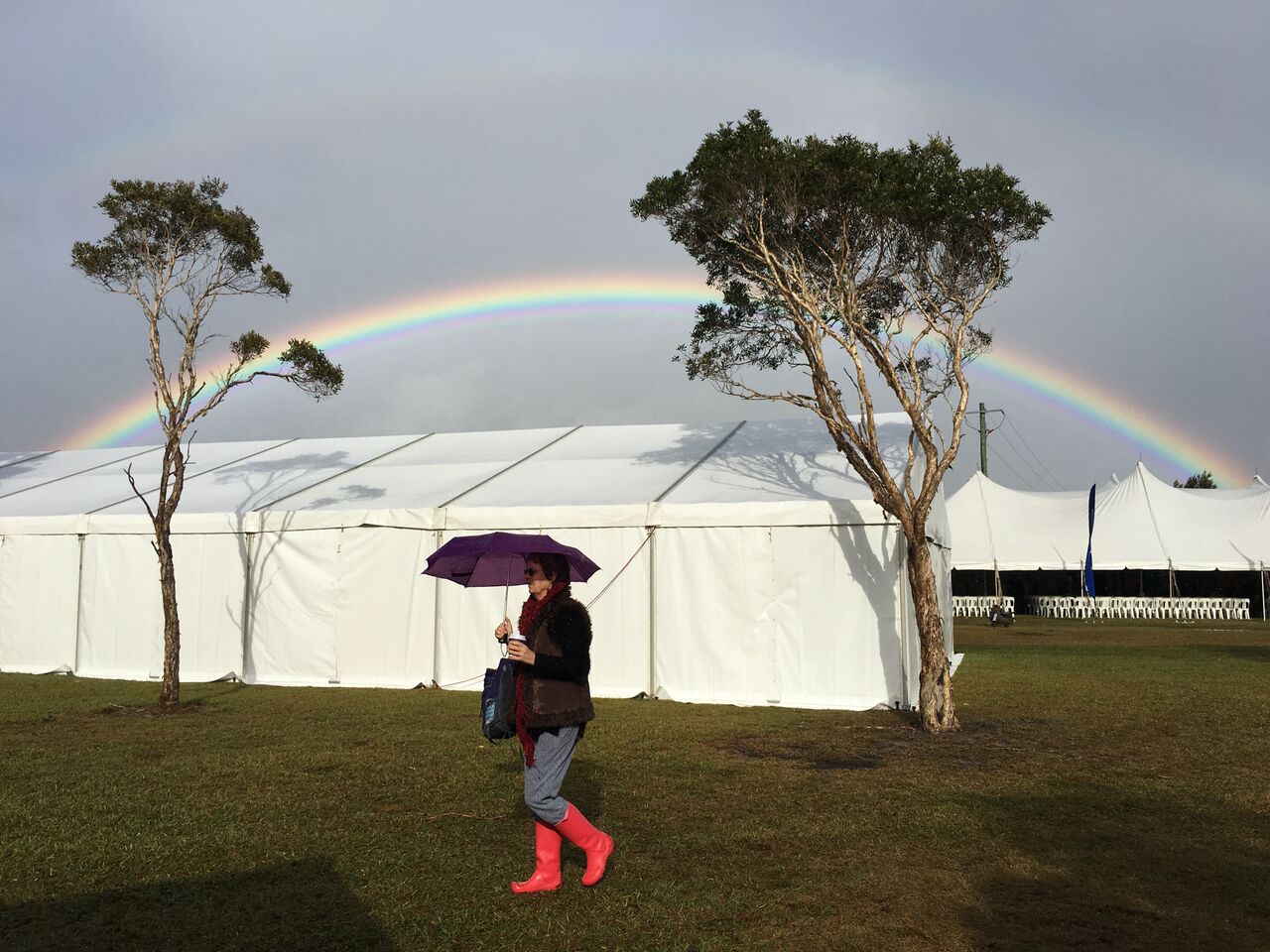
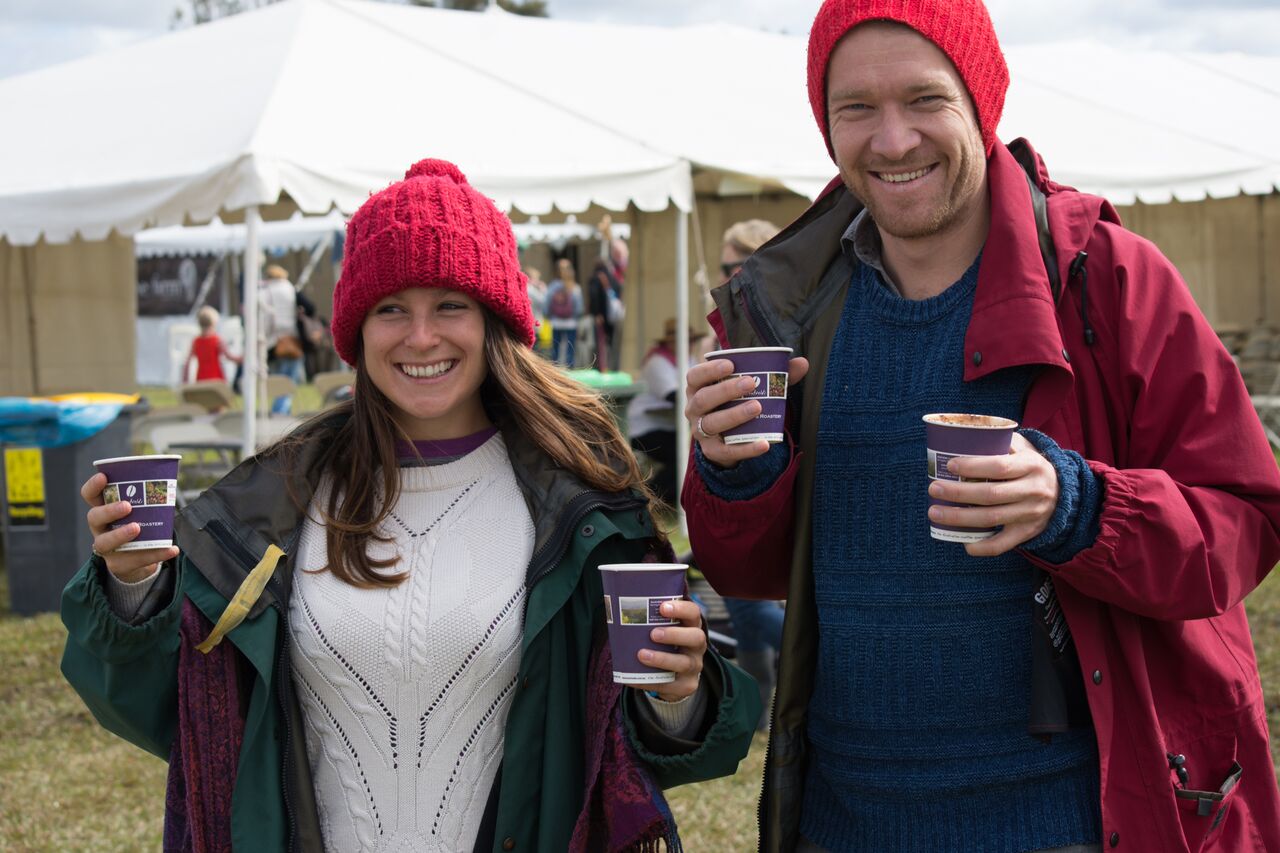 Well, the rain tumbled down and many visits to warm the soul via the coffee tent, while socialising with old friends and strangers from elsewhere, should have kept spirits alive. Only, this wasn’t required, as there was so much knowledge and human experience on offer, so much food for thought within the various marquees, and their assortment of talented authors from all mediums, that the weather took a back seat to the majesty of the event. Sunday saw the warmth return and with the sun a younger crowd. I loved the art instalments scattered around the festival, the variety of cuisine and the smiles of the gentile. My Byron Writers Festival highlights included watching charismatic Yassmin Abdel-Magied signing books, with her broad smile and friendly persona, meeting ABC journalist Sarah Ferguson, watching Delta Kay own the stage on country, Paul Kelly’s big smile and wistful songs, and trying to pen notes amongst the giggling wobble of Bob Brown’s humour. But what really stole the show for me was sitting and meeting folk from all over Australia who had come to pay homage to their idols, gathering in well-trodden wisdoms to inturn share these moments with loved ones.
Well, the rain tumbled down and many visits to warm the soul via the coffee tent, while socialising with old friends and strangers from elsewhere, should have kept spirits alive. Only, this wasn’t required, as there was so much knowledge and human experience on offer, so much food for thought within the various marquees, and their assortment of talented authors from all mediums, that the weather took a back seat to the majesty of the event. Sunday saw the warmth return and with the sun a younger crowd. I loved the art instalments scattered around the festival, the variety of cuisine and the smiles of the gentile. My Byron Writers Festival highlights included watching charismatic Yassmin Abdel-Magied signing books, with her broad smile and friendly persona, meeting ABC journalist Sarah Ferguson, watching Delta Kay own the stage on country, Paul Kelly’s big smile and wistful songs, and trying to pen notes amongst the giggling wobble of Bob Brown’s humour. But what really stole the show for me was sitting and meeting folk from all over Australia who had come to pay homage to their idols, gathering in well-trodden wisdoms to inturn share these moments with loved ones.
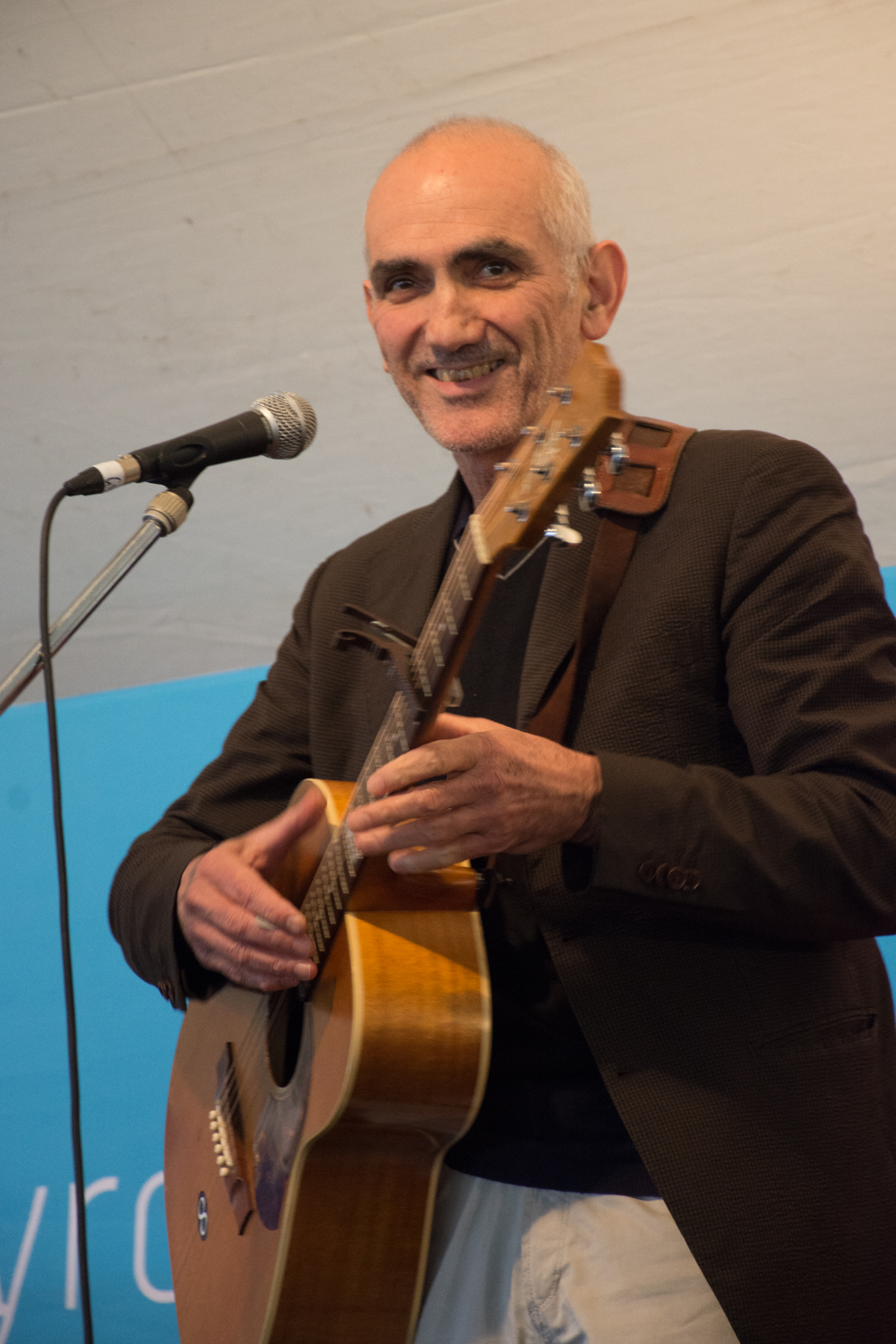 Paul Kelly: Life is Short But Art is Long In conversation with Sarah Kanowski in the Southern Cross University Marquee
Paul Kelly: Life is Short But Art is Long In conversation with Sarah Kanowski in the Southern Cross University Marquee
Well, there’s really no need to introduce this charming chap; he’d have to be one of our most favourite sons. With a long career searching deep within the dungeons of history while reaching millions, Paul described the varying influences and changes to his song writing over the windswept years. As with all the ‘chair’ throughout the festival, the charismatic hosts were as inspiring as the guests they interviewed. Sarah Kanowski was wonderful in her bravado and admiration of Paul Kelly; she was as much a fan as the star-struck crowd that gathered en masse.
Sarah asked Paul Kelly questions related to his new album Seven Sonnets & A Song influenced by Shakespeare’s sonnets. Paul described his time in Melbourne working as an extra on shows like Cop Shop to raise enough money to purchase the works of Shakespeare from a bookshop, humouring the crowd with his inner-struggle to choose only one of Shakespeare’s plays as his favourite. I enjoyed Paul’s analogy to Bluegrass with Elizabethan language, where the pioneers of America had isolated themselves along with their old languages. Mr Kelly also described the difficulties attached to song writing and how folk music included the singing from the perspective of the opposite sex, as he has done himself over the years. Along with haunting songs such as Everything’s Turning to White he also sung a song with the lyrics “you lie with me” in relation to his partner and he both laying together, and telling lies together. Alongside his honesty and broad smile, this was highlight for me because the man sitting next to me began to cry, his wife being very touched by the moment.
To the request of a passionate crowd, Paul Kelly went on to cast further spell amongst the audience with two other songs, one of which took him five minutes to tune his guitar, as he described the fear of perhaps forgetting the lyrics. He was very humble and down-to-earth. That’s why we love him so much. To broad audience laughter, Paul Kelly went on to claim yet another Shakespeare play as his favourite, King Henry V- announcing a favourite line: “I wasted time, now time is wasting me!”
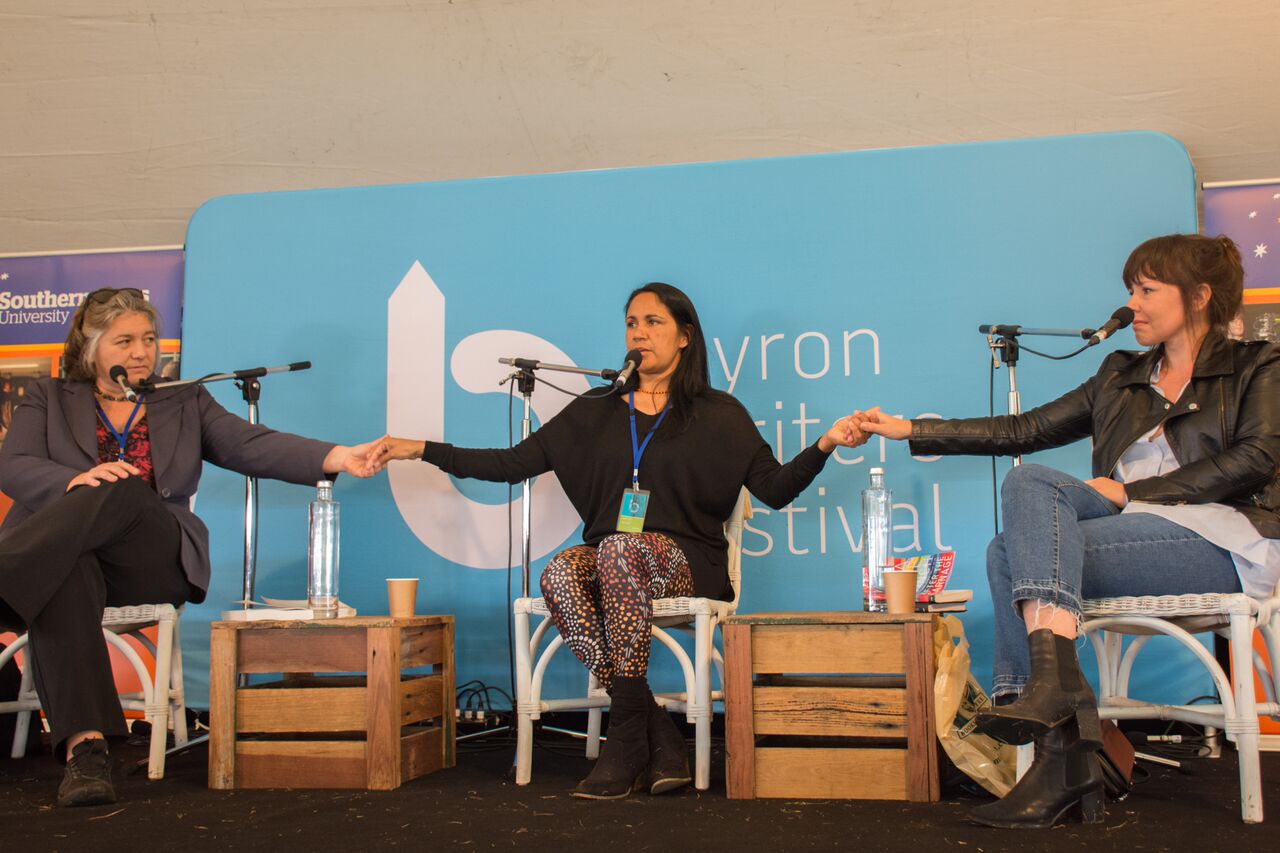
Indigenous Lives Through Women’s Eyes Delta Kay, Tara June Winch. Chair: Melissa Lucashenko in the SCU Marquee
Now, here are three women with an ocean of wisdom to share. Locals will know Delta Kay, a proud Arakwal woman, her work for the environment and her people speaks for itself. Delta spoke about her family’s removal from their land in Byron Bay and the impact of the racism directed towards her while she schooled in Mullumbimby. Delta also described how she went away to Melbourne for 20 years, and what it was like to return home, welcomed by the ancestors- accompanied by vivid memories of a childhood collecting pipis on the beach, and mud crabs crawling around the kitchen floor. I asked Delta what she was proud of most about her children. She described how they had grown to become proud of their culture and sociable to boot.
A celebrated author living in France, Wiradjuri woman Tara June Winch, spoke through tears at the sadness attached to her journeys through the Middle East and Africa, while compiling stories on the lives of those dispossessed. Tara described the emotional impacts of ‘missing home’ for those being forced from country, and how the same dispossession occurs overseas as it does here for indigenous Australians, though under different policies and in different locations. From the chair, Melissa Lucashenko also spoke boldly and with intent. All three ladies were so well composed and confident in communicating their direction in life. Delta asserted how the continuing practice of indigenous culture feathers a prosperous future for indigenous children. A highlight for many was when all three women linked hands sending an emotional Tara into more tears.
ICE NATION: Australia in Crisis Matt Noffs, Luke Williams. Chair: Sean Doherty in the SCU Marquee
Ooh ICE! Such a dirty word, but what are the facts about its impacts on society? Matt Noffs and Luke Williams debated this riveting topic.
Matt Noffs grew up in a family who have helped many. His dad started the Cross’s Wayside Chapel and Matt is now the CEO of the Noffs Foundation, the largest drug and alcohol treatment service provider in Australia. He described how the prohibition of drugs in this country has failed and a new way is needed, including the decriminalising of drugs. He suggested the police also believed this directive necessary where treating drugs should be seen as a health issue, not a crime! His asserted that anecdotal evidence suggested that ice use was a practise within 2% of the population, where most only used ice once a year, thus the media’s description of ice use in Australia as the ‘Zombie Apocalypse’ was incorrect. This spawned opposition from Luke Williams. Luke is a journalist with a history of ice use. He explained how he felt crystal-meth had in fact increased in use, having seen first hand places that resembled Zombie Apocalypses! Luke was imbedded in a house with a drug dealer and used drugs with him for five years. His first book is titled: The Ice Age: a journey into crystal-meth addiction, which tells the untold stories from the outer suburbs.
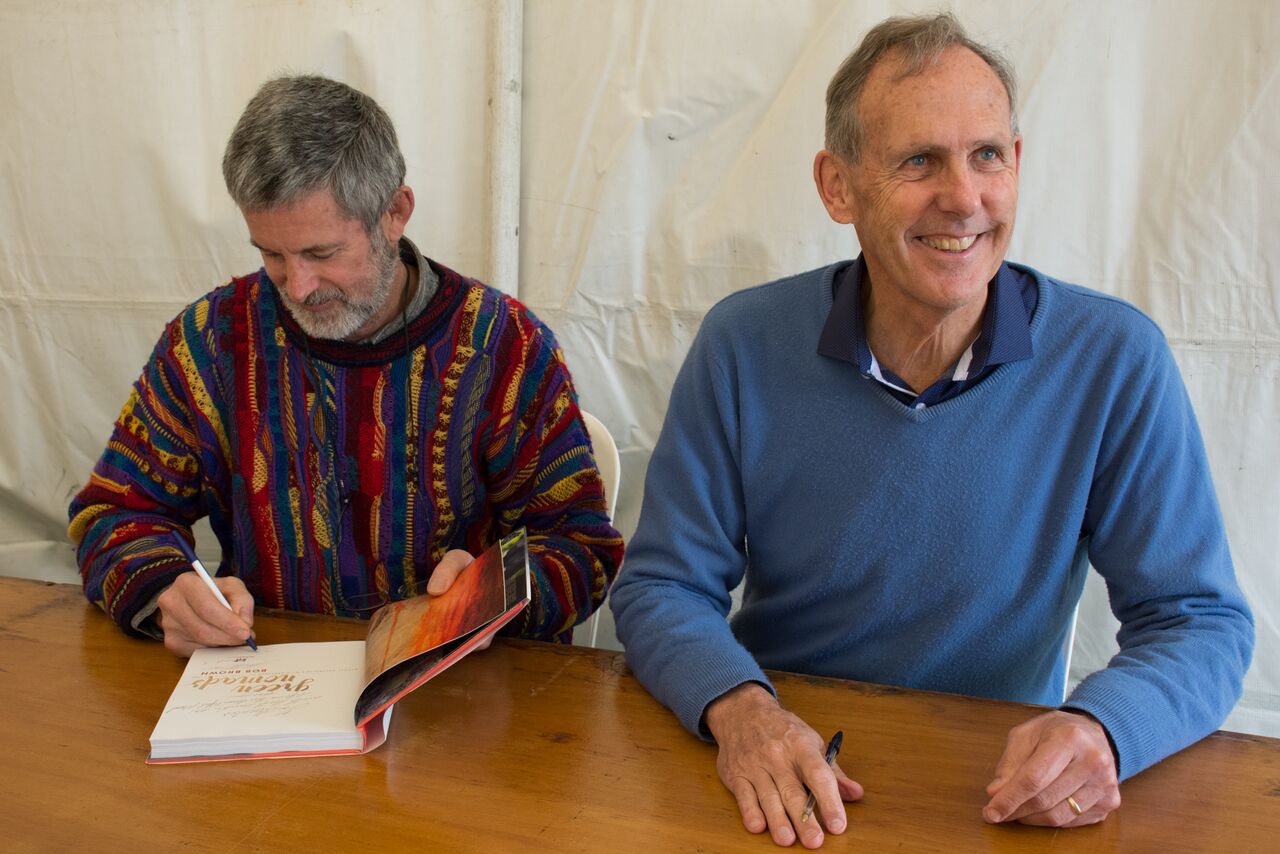
Environmental Rights: A Human Rights Issue Bob Brown, Peter Doherty, David Manne. Chair: Anne Summers in the SCU Marquee
Wow, what a barrel of think tanks, and they were funny too. There were very few empty seats afforded to those turning up late to the discussion. Anne Summers steered the trio admirably through such important topics, the main theme being the sustainable management of our planet as being a fundamental human right.
Of this eco-loving community, Bob Brown would have to sit towards the top pier of their combined admiration and respect, such a great environmental champion of this country. What all three men had to say on the future of the planet, and how we need to socially coordinate ourselves more effectively to improve ‘Life’s” chances, was noble, but really for me it was Bob’s sharp wit that kept me enthralled throughout. All three gentlemen agreed that the way society has continuously voted in hapless leaders married to preordained policies that line the pockets of the puppeteers of eco-obliterating development, needs to change drastically. It’s the political behaviour and the power that lies within individuals to demand change that will save an overpopulated planet. Bob was vigilant in relation to all things Adani Mine, and ‘our’ dropping the batten of protest against an international law breaking Japan with its continuation of whaling in the ocean to our south.
Nobel Prize winning scientist Peter Doherty drew laughter at his dismissal to any notion of Malcolm Turnbull being socially-intellectually-stimulating. He asserted the necessity to arm the youth with the knowledge to sack the polluters of this planet, feathered by our democratic duty to air and share evidence of ecologically damaging practices. Human Rights lawyer David Manne explained – where there are many globally recognised laws protecting both human and civil rights, in effect they cannot exist if they are not upheld.
John Marsden in conversation with Phil Brown in the Greenstone Partners Marquee
Principal of two alternative schools in Melbourne, oh yes and we mustn’t forget that he’s a well-known author too, drew a crowd that met all demographics. John Marsden spoke not only of the schools he administers, but the psyche of some of the children that inhabit their open spaces. He mentioned how important it was to better understand children, while showing them the respect they deserve. He went on to describe how corporate punishment at a prestigious school in Geelong, and the corruption that lay within, and his time in the mental health wing of a hospital, had changed the way he looked at life. John reminisced of the enjoyment he received from using old London-based transcripts to gain an insight into the lives of those of the 18th Century for his teen fiction South of Darkness, and how it was important never to gloss over events, but to describe a character in all their rotten glory. John Marsden has also found inspiration from his time in Byron Bay for the Writers Festival, where he has put pen to paper with gusto during his stay.
Reading: Portals to a Thousand Worlds Jeffery Renard Allen, Catherine Keenan, Charlotte Nash, Damon Young. Chair: Geordie Williamson in the Feros Marquee
Charlotte Nash, author of such romantic novels as The Horseman, described how when reading the description of a place from a distance, such as her hometown Perth while living in Paris, made the place feel new and different, and how reading instilled a sense of power. Damon Young, author of The Art of Reading, described how it was the reader’s job to bring the words within a book to life, rendering universes, while discussing the snobbery Virginia Woolf withheld for the work of other authors. Catherine Keenan, executive director of the Sydney Story Factory, communicated the neuroscience behind reading, and how time and life’s experiences can change the way an individual relates to a book. Author of the Song of the Shank , and judge for the National Book Award- Jeffrey Renard Allen, talked about the attitude of readers to books, where his Afro-American upbringing found him hiding his books in his back pocket, as it was deemed nerdy to be a reader. Host Geordie Williamson, publisher of Picador Australia, joked about the helpfulness of heading straight to page 79 of any novel to gain an insight into the nuts n bolts of a story, when deciding whether to publish or not.
The Lure of Elsewhere Sarah Holland-Batt, Hugo Race, Dominic Smith. Chair: Jeni Caffin in the Feros Marquee
This poetic panel discussed the powerful insights travel had gifted them, arming them with such emotive writing tools. A Sydneysider now residing in the US, author of The Last Painting of Sara de Vas –Dominic Smith, described his experiences amongst poverty in places like Central America, allowing him see the world through new eyes. He read a passage from his novel on the description of a flat above a New York Laundromat. It was breathtaking! Sarah Holland-Batt, award winning poet and author of The Hazards, also mesmerized the crowd with a read of one of her earlier poems, which related to a personal journey through life in a place far away to the south. Her account of being a poet from the Gold Coast as being a rarity in nature amused us all, and she also described the impact of her wanderings on the voice within her writing. One time member of Nick Cave and the Bad Seeds –Hugo Race, also talked of the impact of time spent in far-flung places on his writing, while he surprised listeners with his description of the moment while aged 14 when he ran away from his home in the south of France, to Brussels, to feed his fascination for the Napoleonic Wars!
I also enjoyed listening to the political and journalistic insights Niki Savva and Sarah Ferguson shared and the journey via the slightly tarnished side of humanity with poetry- slam geniuses Miles Merrill and Philip Wilcox. At the end of the day, there was so much to see, hear and learn from within this happy event, that I can only recommend a visit to future Byron Writers Festivals as a must for any personality, transcending the age-spectrum.
Photos: Kirra Pendergast
